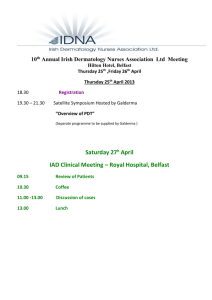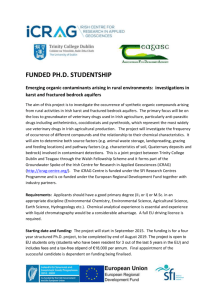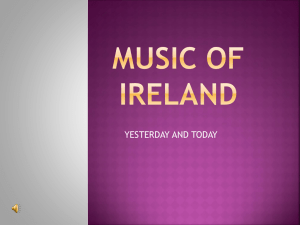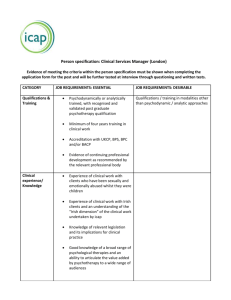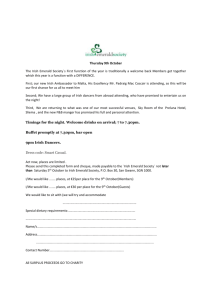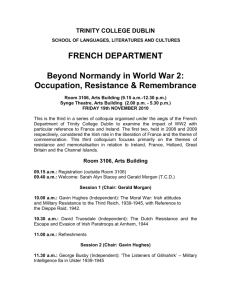Women`s life writing and historical change 1780-1970
advertisement
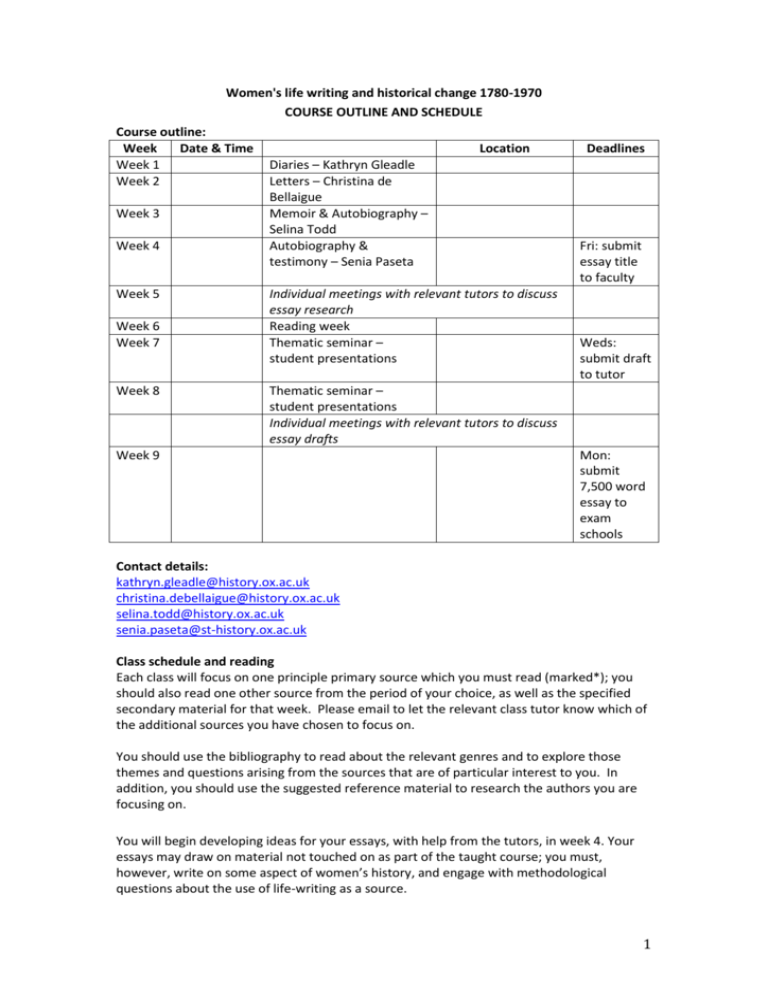
Women's life writing and historical change 1780-1970 COURSE OUTLINE AND SCHEDULE Course outline: Week Date & Time Week 1 Week 2 Week 3 Week 4 Week 5 Week 6 Week 7 Week 8 Location Diaries – Kathryn Gleadle Letters – Christina de Bellaigue Memoir & Autobiography – Selina Todd Autobiography & testimony – Senia Paseta Individual meetings with relevant tutors to discuss essay research Reading week Thematic seminar – student presentations Deadlines Fri: submit essay title to faculty Weds: submit draft to tutor Thematic seminar – student presentations Individual meetings with relevant tutors to discuss essay drafts Week 9 Mon: submit 7,500 word essay to exam schools Contact details: kathryn.gleadle@history.ox.ac.uk christina.debellaigue@history.ox.ac.uk selina.todd@history.ox.ac.uk senia.paseta@st-history.ox.ac.uk Class schedule and reading Each class will focus on one principle primary source which you must read (marked*); you should also read one other source from the period of your choice, as well as the specified secondary material for that week. Please email to let the relevant class tutor know which of the additional sources you have chosen to focus on. You should use the bibliography to read about the relevant genres and to explore those themes and questions arising from the sources that are of particular interest to you. In addition, you should use the suggested reference material to research the authors you are focusing on. You will begin developing ideas for your essays, with help from the tutors, in week 4. Your essays may draw on material not touched on as part of the taught course; you must, however, write on some aspect of women’s history, and engage with methodological questions about the use of life-writing as a source. 1 Class 1) Diary: literary production, public and private identities Primary sources Period / place th Source Late 18 C, early 19thC, England - *Mary Moorman (Ed), Journals of Dorothy Wordsworth: the Alfoxden Journal, 1798; the Grasmere journals, 1800-1803. Please focus in particular on part IV [4 may 1802 – 16 January 1803] [Note: there are plenty of college copies of this text, although we can make a PDF version available to you if necessary]. Mid 19th, England Diaries of Anne Lister, 1791-1840 We will focus on the year 1819: [a PDF version can be made available if necessary] Mid 19thC, Ireland Diary of Rose la Touche, 1861 and January 1867 [Available via "British and Irish Women's Letters and Diaries” database – accessed via oxlip. Or consult in Van Akin Burd, ed, John Ruskin and Rose La Touche, Her unpublished diaries (1979) Mid 20thC, England Nella Last Diary, 1939-1945 [Available via SOLO on Mass Observation Online as diarist number 5353. Note there is also lots of other useful material available on this website.] Please consult the years 1943 and 1951 Secondary sources: *[introductory] R.Hogan, "Engendered Autobiographies: The Diary as a Feminine Form." Prose Studies: Special Issue on Autobiography and Questions of Gender 14.2 (September 1991): 95-107 Wordsworth: *Jill Ehnnen, “Writing against, writing through: subjectivity, vocation and authorship in the work of Dorothy Wordsworth”, South Atlantic Review, 64 (1999), PP.72-90 Patricia Comitini, "More than half a poet": vocational philanthropy and Dorothy Wordsworth’s Grasmere Journals", European Romantic Review 14 (3) (2003) PP.307-322 Susan Levin, Dorothy Wordsworth and Romanticism (1987) Lucy Newlyn, "Dorothy Wordsworth's experimental style", Essays in Criticism 57 (4) (2007), PP.325-49 Lister: *Danielle Orr, “I tell myself to myself: homosexual agency in the journals of Anna Lister”, Women’s Writing, 11 (2) (2004) Or: *Jill Liddington, “Anne Lister of Shibden Hall, Halifax: her diaries and historians”, History Workshop Journal, 35 (1993), PP.45-77 Anna Clark, “Anne Lister’s construction of lesbian identity”, Journal of the History of Sexuality, 7 (1) (1996), PP.23-50 La Touche: 2 *Jane H Hunter, ‘Inscribing the self in the heart of the family: diaries and girlhood in lateVictorian America’, American Quarterly 44 (1) 51-81. C. Steedman, The Tidy House (1982), chapter 3 Nella Last: *L.Stanley, “Women have servants and men never eat meat: issues in reading gender, using the case study of mass observation’s 1937 day diaries”, Women’s History Review 4 (1) (1995), 85-102 Dorothy Sheridan et al, Writing ourselves: mass-observation and literary practices (2000) James Hinton, Nine wartime lives: mass observation and the making of the modern self (2010) introduction and chapter 2 Class 2) Letters: Girlhood, work and career, relationships & poverty Primary sources Period / place th Source Late 18 C, England Essex Pauper Letters, 1731-1837 (ed. Thomas Sokoll) [a selection will be circulated to students] Mid 19thC, England *Letters of Octavia Hill, 1852-1853,1864-1868 [available via OXLIP on British and Irish Women’s Letters & Diaries] *Letters to Fellow-Workers, 1872 & 1873 in Octavia Hill’s Letters to Fellow-Workers, 1872-1911 ed. R. Whelan (2005) Mid 19thC, Australia Letters of Isabella Wyly, 1856-1877 in D. Fitzpatrick, Oceans of Consolation: personal accounts of Irish migration to Australia, (Cork, 1994) [online via OXLIP] Early 20thC, England Letters of Winifred Holtby and Vera Brittain, (1920-1935) (ed. V. Brittain and G. Handley-Taylor) [a selection will be circulated to students] Secondary sources: *[Introductory] P.A.M. Spacks, 'Personal letters', in J. J. Richetti, (ed.), The Cambridge history of English literature, 1660-1780 (2005) M. Jolly, L. Stanley, ‘Letters as / not a genre’ Life Writing, 2,2, (2005) Pauper letters: *T. Sokoll, ‘Writing for relief: rhetoric in English pauper letters’ in Gestrich, King & Raphael (eds.) Being poor in Modern Europe, 1800-1940 (2006), and Chs I and IV in Essex Pauper Letters S. King, “I fear you will think me too presumptuous in my demands but necessity has no law”: clothing in English pauper letters, 1800-1834’ International Review of Social History, 54 (2009) 207-36. Octavia Hill: 3 *J. Lewis, Women and social action in Victorian and Edwardian England, (1991), Introduction, Ch.1. *Octavia Hill’s Letters to Fellow Workers 1872-1911, ed. R. Whelan (2005) ‘Editor’s Introduction’ Stephen P. Walker. ‘Philanthropic women and accounting. Octavia Hill and the exercise of ‘quiet power and sympathy’, Accounting, Business & Financial History, 16:2, (2006) 163-194 G. Darley, Octavia Hill (1990) H. Jones, ‘Recognizing fellow creatures: FD Maurice, Octavia Hill, Josephine Butler’ in V. Morgan & C. Williams (ed.) Shaping belief: culture, politics and religion in 19thC writing (2008) Isabella Wyly: *D. Fitzpatrick, Oceans of Consolation: Personal accounts of Irish migration to Australia (1994), Ch.16 ‘Correspondence: ceremonies of communication’ D. Mcraild, ‘Review article: personal narratives of emigration and adjustment’ Irish Historical Studies, 36:141 (2008) R. A. Harris, ‘Come you all courageously’: Irish women in America write home’ Eire-Ireland: a journal of Irish studies, (Spring-Summer 2001) Vera Brittain & Winifred Holtby: D. Gorham, V. Brittain, A feminist life (1996) M. Shaw, The clear stream: a life of Winifred Holtby (London 1999) *C. Clay, Re-visiting the friendship of Vera Brittain and Winifred Holtby: a ‘trade’ in work and desire, Women's History Review, 12:2 (2003), 309-328 C. Acton, ‘Writing and Waiting: The First World War Correspondence between Vera Brittain and Roland Leighton’ Gender & History, 11:1 (April 1999) 54–83. Class 3) Autobiography & Memoir: Selfhood, class and feminism Primary sources: Period / place th Late 18 C, England Source Lucy Luck, A Little of My Life (1992); or see extract reprinted in J. Burnett, Useful Toil (1975) Early 20th C, England Vera Brittain, Testament of Youth, (1933) Late 19thC/early 20thC, England H. Mitchell, The Hard Way Up (1968/1977) Mid 20thC, England *Carolyn Steedman, Landscape for a good woman (1986) Secondary sources: 4 *L. Stanley, ‘Movements of Writing: is there a feminist auto/biography?’, Gender and History 2:1 (1990). R. Gagnier, ‘Social atoms: working-class autobiography, subjectivity and gender’, Victorian Studies, 30:3 (1987) Hannah Mitchell J. Purvis, ‘Deeds not words. The daily lives of militant suffragettes in Edwardian England’, Women’s Studies International Forum 18:2 (1995). W. Webster, ‘Our life. Working class women’s autobiography in Britain’ in F. Bonner et al eds. Imagining Women: Cultural representations and gender (1992) Vera Brittain: D. Gorham, Vera Brittain: A feminist life (1996) H. Kean ‘Searching for the past in present defeat: the construction of historical and political identity in British feminism in the 1920s and 1930s’ in Women’s History Review 3:1 (1994). P. Berry and M. Bostridge, Vera Brittain: a life (1993) Carolyn Steedman: Rosner, Victoria, 'Have you seen this child? Carolyn K. Steedman and the writing of fantasy motherhood ', Feminist Studies 26 (2000) 1, 7-32 G. Eley, The Crooked Line (2005). *E. Setch, ‘Personal History’ (review piece), History Workshop Journal, 53:1 (2002). Additional: B. Caine, ‘The making of Catherine Cookson’s autobiography’, Women’s History Review, 22:1 (2013). R. Gagnier, ‘Democratic subjects: the self and the social in nineteenth-century England’, Victorian Studies 39:3 (1996). E. Griffin, ‘Sex, illegitimacy and social change in industrialising Britain’, Social History, 23:2 (2013). P. Graves, Labour Women (1994) J. Hannah and K. Hunt, Socialist women: Britain, 1880s-1920s (2002) *C. Langhamer, ‘Love, Selfhood and Authenticity in Postwar Britain’, Cultural and Social History, 9:2 (2012). H. Rogers, Women and the people: authority, authorship and the radical tradition in 19thC England (2000) N. Rose, Inventing ourselves (1999) J.M. Strange, ‘Fatherhood, providing and attachment in late Victorian and Edwardian working-class families’, Historical Journal 55:4 (2012). 5 Class 4) Autobiography and testimony: Writing Citizenship in Ireland, c. 1916-1940 – political identities, citizenship, public and private identities Primary Sources: Period / place Source th R. Frow & E. Frow (eds) Political women, 1800-1850 (1989) [details tbc] th Mid 19 C, Ireland Anna Parnell, The tale of a great sham (ed. D Hearne) (1986) [details tbc] Early 20thC, Ireland *Margaret Skinnider, Doing my Bit for Ireland, New York, (1917) [details tbc] Early 20thC, Ireland - * Helena Molony witness statement: Bureau of Military History [available via http://www.bureauofmilitaryhistory.ie/bmhsearch/search.jsp ] Late 18 C, England Secondary sources: Cullen Owens, Rosemary, A Social History of Women in Ireland, 1870-1970, (Dublin: Gill and Macmillan, 2005). McCarthy, Cal, Cumann na mBan and the Irish Revolution, (Cork: Collins Press, 2007). McCoole, Sinéad, Guns and Chiffon: Women Revolutionaries and Kilmainham Gaol, 19161923, (Dublin: Stationary Office, 1997). McCoole, Sinéad, No Ordinary Women: Irish Female Activists in the Revolutionary Years, 1900-1923, (Dublin: O’Brien Press, 2004). * Eve Morrison, ‘The Bureau of Military History and Female Republican Activism’ in Maryann G Valiulis (ed.), Gender and Power in Irish History, (Dublin, 2009). Taillon, Ruth, When History was Made: The Women of 1916, (Belfast: Beyond the Pale, 1996). *Townshend, Charles, ‘Historiography: Telling the Irish Revolution’ in Joost Augusteijn (ed.), The Irish Revolution, 1913-1923, (Basingstoke: Palgrave, 2002), pp. 1-16. Townshend, Charles, Easter 1916: the Irish Rebellion, (London: Allen Lane, 2005). * Weihman, L, ‘Doing My Bit for Ireland: Transgressing Gender in the Easter Rising’, EireIreland, 39:3&4, (Fall/Winter, 2004), pp. 228-249. Wills, Clair, Dublin 1916: The Siege of the GPO, (London: Profile, 2009). Paseta, Senia. Irish Nationalist Women, 1900-1918, (Cambridge, 2013). Memoir/biography: Czira, Sydney, The Years Flew By: The Recollections of Madame Sydney Czira, (Dublin: Gifford and Craven, 1974). Gonne MacBride, Maud, A Servant of the Queen, (Dublin: Golden Eagle Books, 1950). Gray, Betsy, ‘A Memory of Easter Week’, Capuchin Annual, 1948, pp. 281-285. Éilis Ni Riain, ‘A Cumann na mBan Recalls Easter Week’, Capuchin Annual, 1966, pp. 271-278. Maire Nic Shiubhlaigh (and Edward Kenny) The Splendid Years: Recollections of Maire Nic Shiubhlaigh’s Story of the Irish National Theatre as told to Edward Kenny, (Dublin: J Duffy, 1955). O’Brennan, Lily M, ‘The Dawning of the Day’, Capuchin Annual, 1936, pp. 157-59. 6 Plunkett Dillon, Geraldine, All in the Blood: A Memoir of the Plunkett Family, the 1916 Rising and the War of Independence (edited by Honor O Brolchain), (Dublin: A & A Farmar, 2006). Reynolds, M, ‘Cumann mBan in the GPO’, An t-Óglach, March, 1926. Sheehy Skeffington, Hanna, British Militarism as I Have Known It, (Tralee: Kerryman, 1946). Sheehy Skeffington, Hanna, ‘Reminiscences of an Irish Suffragette’, in Andrée Sheehy Skeffington and Rosemary Cullen Owens, Votes for Women, (Dublin, 1975), pp. 12-26. 7
